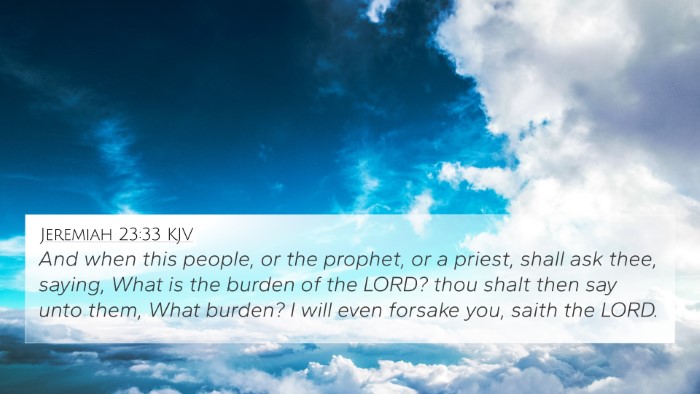Ezekiel 12:22 - Interpretation and Understanding
Ezekiel 12:22 states: "Son of man, what is that proverb that you have in the land of Israel, saying, 'The days are prolonged, and every vision fails'?" This verse reflects a critical moment in the prophetic ministry of Ezekiel, addressing the skepticism of the Israelites concerning God's promises and prophecies.
Summary of Meaning
In this verse, God, through Ezekiel, challenges the popular proverb among the Israelites which implies that God's words and prophecies would not come to pass within their lifetime. The phrase "The days are prolonged, and every vision fails" signifies a growing disbelief among the people about the prophetic declarations regarding impending judgment and restoration.
Commentary Insights
- Matthew Henry:
Henry points out that the proverb reveals a troubling attitude among the people who were dismissing the prophecies of doom foretold by Ezekiel, perhaps due to the delay of the expected judgment. He emphasizes God's unwavering commitment to fulfill His word regardless of human skepticism.
- Albert Barnes:
Barnes discusses the context of this proverb as indicative of Israel's national spiritual malaise. He explains that the repeated assurances of punishment and eventual restoration were met with doubt, and God's inquiry through Ezekiel seeks to address this lack of faith.
- Adam Clarke:
Clarke elaborates on the cultural relevance of proverbs in Israelite society, noting that such sayings had a deep-rooted influence on the people's perspectives. He interprets God's challenge as a reminder that time and perspective should not dilute divine promises.
Thematic Bible Verse Connections
This verse can be cross-referenced with various passages throughout the Bible that address themes of prophecy, disbelief, and God's faithfulness. Here are some relevant scriptures to explore further:
Cross References
- Jeremiah 23:32: God warns against false prophets and highlights the importance of truth in prophecies.
- Habakkuk 2:3: This verse speaks about the vision appointed for an "appointed time," assuring that it will not be delayed.
- 2 Peter 3:9: This verse reassures believers that God's promises may seem delayed but are ultimately fulfilled in His timing.
- Isaiah 30:10: The people were longing for smooth sayings rather than true prophecies, reflecting their denial of God’s warnings.
- Matthew 24:36: Jesus speaks to the unknowingness of the exact timing of future events, emphasizing readiness and faith.
- Lamentations 2:17: This verse reflects on God’s sovereignty and the certainty of His decrees, contrasting human perceptions of delay.
- Hebrews 10:37: The verse reassures believers of the coming fulfillment of God's promises, echoing the theme in Ezekiel.
Lessons in Faith and Expectation
The message of Ezekiel 12:22 serves as a vital reminder that faith entails trusting in God's promises despite appearances. The ridicule of the proverb indicates a struggle with believing in the unseen realities of God's plans.
Tools for Bible Cross-Referencing
For those looking to dive deeper into cross-referencing, consider utilizing resources such as:
- Bible Concordance: A tool that helps identify keywords and their occurrences throughout the Bible.
- Bible Cross-reference Guide: A systematic way to find related passages and themes.
- Bible Reference Resources: Collections or applications that provide links between scriptural texts.
- Bible Chain References: A method to connect various scriptures in a thematic train of thought.
Conclusion
Ezekiel 12:22 challenges readers to confront their own beliefs about the fulfillment of God's promises. By exploring cross-references and understanding the historical context, one can appreciate the depth of meaning behind this prophetic message. Through comparative Bible verse analysis and thematic connections, believers can enhance their understanding of God's timing and faithfulness.
As you study this verse and its connections with other scriptures, may you deepen your understanding of Scripture and grow in your faith as you navigate the complexities of God's word.











